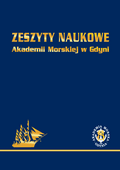abbr. SJ GMU
ISSN 2657-5841 (printed)
ISSN 2657-6988 (online)
DOI: 10.26408
108
W bieżącym numerze Zeszytów Naukowych Akademii Morskiej w Gdyni zamieszczono publikacje pracowników Wydziału Mechanicznego UMG, Akademii Morskiej w Szczecinie, Akademii Marynarki Wojennej w Gdyni, Politechniki Gdańskiej i Zachodniopomorskiego Uniwersytetu Technologicznego w Szczecinie.
W zeszycie przedstawiono zagadnienia związane z eksploatacją siłowni morskich jednostek pływających. Omówiono na przykład problemy eksploatacyjne z uwzględnieniem diagnostyki maszyn i urządzeń okrętowych, zagadnienia ochrony środowiska i bezpieczeństwa oraz modelowania wybranych procesów.
Problematyka artykułów dotyczy diagnostyki silników okrętowych z zastosowaniem różnych metod, w tym opierającej się na pomiarze amplitudy składowych harmonicznych drgań skrętnych wału korbowego i wykorzystaniu średniego ciśnienia indykowanego, a także pomiaru ciśnień cylindrowych według nowej koncepcji.
Zaprezentowano stan wiedzy dotyczący emisji gazów cieplarnianych w żegludze. Wskazano techniczne rozwiązania umożliwiające ograniczenie emisji dwutlenku węgla, w szczególności przez zastosowanie niekonwencjonalnych źródeł energii w układach energetycznych statków oraz wykorzystanie amoniaku jako paliwa w silnikach spalinowych bądź w ogniwach paliwowych.
Tematyka artykułów objęła również zagadnienia modelowania procesu roboczego okrętowego silnika tłokowego, modelowania charakterystyki prędkości statku ze śrubami nastawnymi.
Przedstawiono m.in. problematykę pneumatycznego transportu paliwa stałego do kotła okrętowego oraz poprawy bezpieczeństwa i komfortu pracy podczas eksploatacji i remontów siłowni okrętowych.
W jednym z artykułów dokonano identyfikacji oraz oceny jakościowej źródeł energii odpadowej konwencjonalnego turbinowego układu napędowego (CST), analizując możliwości zastosowania inżektora parowego w celu odzysku ciepła utajonego.
W innym przeprowadzono ocenę mocy cieplnej aparatów wymiany ciepła siłowni parowych dla różnych stanów ich użytkowania w aspekcie degradacji termicznej.
Dr hab. inż. Kazimierz Witkowski, prof. nadzw. UMG
PREFACE
In the current issue of the Scientific Journal of Gdynia Maritime University, there are presented publications of the employees of Faculty of Marine Engineering of Gdynia Maritime University, Maritime University of Szczecin, Polish Naval Academy, Gdansk University of Technology and West Pomeranian University of Technology in Szczecin.
The Journal contains articles related to the operation of marine ships. For example, among other things, operational issues including ship engine diagnostics, environmental protection and safety issues, modelling of selected processes were discussed.
The articles concerning the diagnostics of marine engines using various methods were presented, including the method based on the measurement of the amplitude of the harmonic components of crankshaft torsional vibrations, the method with the use of the mean indicated pressure, as well as cylinder pressure measurement according to the new concept.
The state of knowledge regarding the emission of greenhouse gases in shipping was presented. Technical solutions to reduce carbon dioxide emissions have been indicated, in particular through the use of unconventional energy sources in ship power systems, and the use of ammonia as fuel in internal combustion engines or in fuel cells.
The subject matter of the articles also covered the issues of modelling of the working process of a ship's piston engine, and modelling of the speed characteristics of the ship for a two-shaft ship with control pitch propellers.
The problems of pneumatic transport of solid fuel to the ship's boiler and improvement of safety and comfort during operation and repairs of ship power plants were also presented.
In one of the articles the identification and quality assessment of waste energy sources of a conventional turbine drive system (CST) was made and the possibilities of using a steam injector for the recovery of latent heat were analyzed. There is also an article regarding the assessment of the thermal power of steam power plant heat exchangers for their various operating modes in the aspect of their thermal degradation.
Dr hab. inż. Kazimierz Witkowski, prof. nadzw. UMG

-
The Concept of Increasing Regeneration Degree of Steam CyclePages:9- 21
-
Analysis and Evaluation of the Correctness of the Function of a Friction Couple in the Aspect of the Second Law ThermodynamicsPages:22- 33
-
Amplitude Changes of Component Harmonic of Torsional Vibration of the Shaft of the Petrol Fuel Unit on the Influence of Changes of Fuel DosesPages:34- 42
-
The Thermal Power Appraisal of Steam Power Plant Heat Exchangers for Their Various Operating Modes in the Aspect of Their Thermal DegradationPages:43- 54
-
Additional Training of Young Engineers in Shipping Company to Increase Professional Competences to Take on Duties in Engine RoomPages:55- 66
-
The Adequacy of Marine Diesel Engine Model Developed for Diagnostic TestPages:67- 80
-
Improvement of Work Safety and Comfort During Engine Room Exploitation and Repair WorksPages:81- 91
-
The Influence of Configuration of Pneumatic Transport Installation of Solid Fuel on Flow ResistancePages:92- 102
-
Modeling of the Speed Characteristic of the Ship with the Control Pitch Propellers Based on Research ResultsPages:103- 114
-
Method of Determining the Time Constant of Thermocouple Based on Measurement of the Quick – Changing Temperatures of Exhaust Gases in Marine Diesel EnginesPages:115- 133
-
Comparative Analysis of Low Temperature Pyrolysis Products of Selected Plastics in a Low Pressure Reactor – Preliminary ResearchPages:134- 142
-
Reduction of Greenhouse Gases Emissions from Ships – Ammonia as Fuel of the FuturePages:143- 152
-
In Service Diagnosing of a Marine Diesel Engine Using Mean Indicated PressurePages:153- 167
-
Modification of the System for Measuring Combustion Pressure in the Ship Piston Engine Sulzer AL25/30Pages:168- 180
-
The Selected Ways of Improving the Factors of Energy Efficiency of ShipsPages:181- 196
